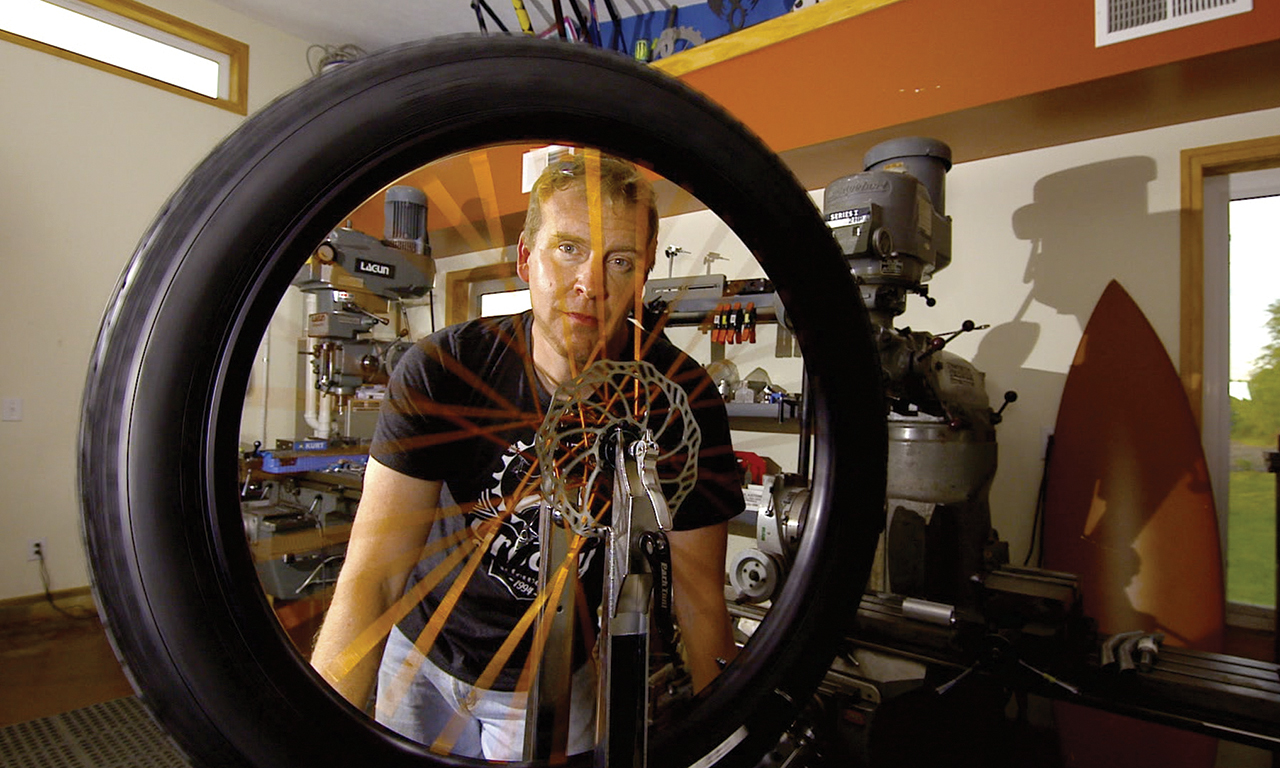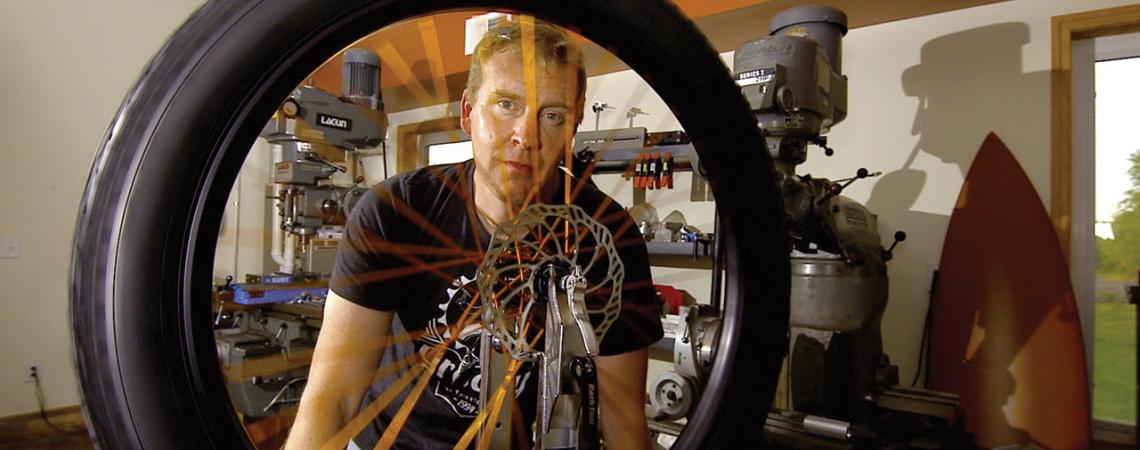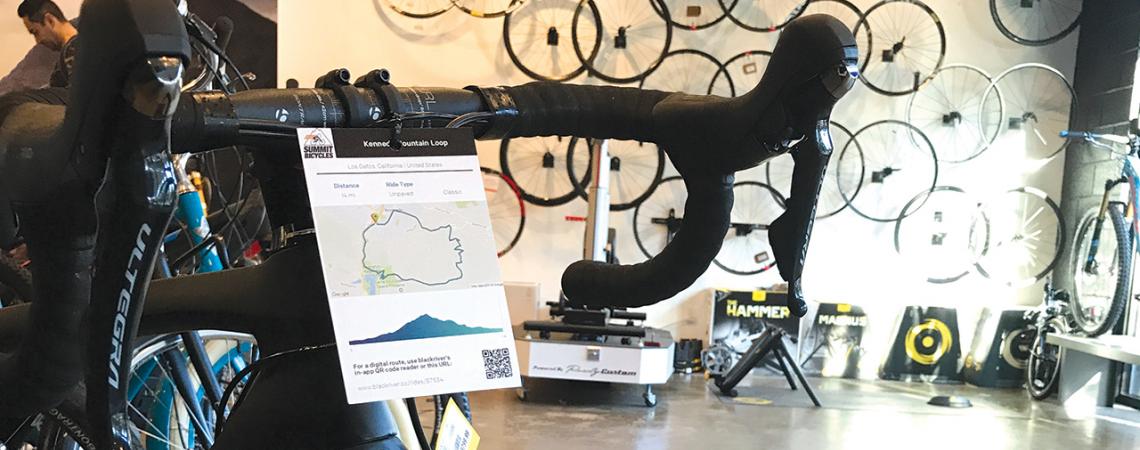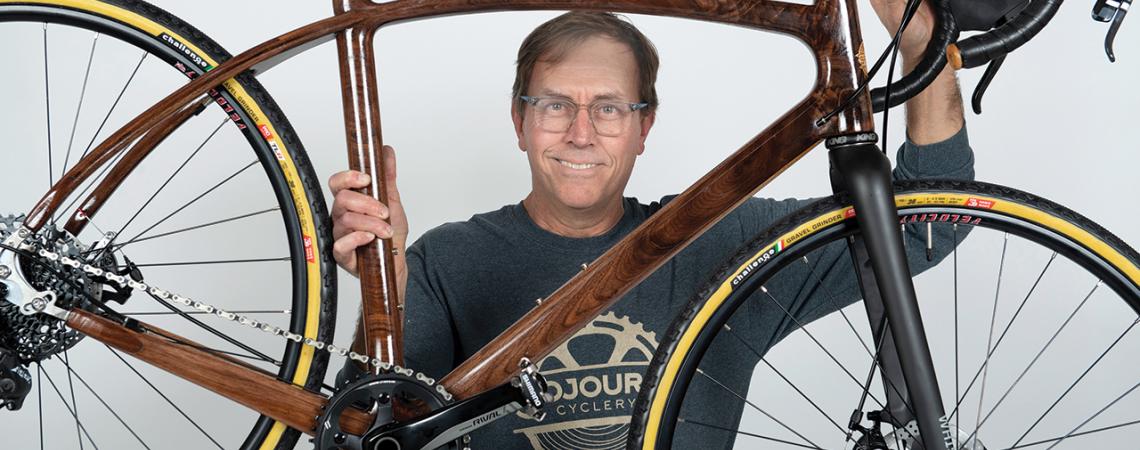Rody Walter started Groovy Cycleworks after searching in vain for a tandem bike that fit his needs. (Photo courtesy of Groovy Cycleworks.)
To the casual cyclist who buys a ride off the rack, so to speak, the choices available in the creation of a custom bicycle might seem overwhelming. Clipless or flat pedals? A performance saddle, or something easier on the backside? How many gears? Flat or curved handlebars? But first, the geometry of the frame, from the angle of the head tube to the shape of the fork. What about construction materials? Do you want titanium? Stainless steel? Wood? Yes, wood. We’ll come back to wood later.
Ohio has a history of bicycle making that goes even beyond the origin story of the Wright Brothers (which, obviously, is an important bit of history in its own right).
In the early part of the 20th century, Cleveland’s Murray Bikes and Dayton-based Huffy were among the manufacturers that made Ohio a national leader in the bicycle industry. Today, though there are no bicycles built at production scale in Ohio (Huffy Corp. remains headquartered in Dayton), a small number of bicycle craftsmen continue to draw focus to the Buckeye State. They create specialty rides that bring a competitive edge in a race, or simply stand out from the other bikes on the local path.
Groovy Cycleworks, Wooster
Rody Walter started creating his own bike frames in 1994, after searching in vain for a tandem bicycle that he and his wife could use for backroad camping adventures — “something that was sturdy, overbuilt, and had some suspension capability,” he recalls. Finding nothing in the retail shops to meet his needs, Walter turned to a custom bike maker in Pennsylvania. While visiting the shop, he says, “I fell in love with the creativity inherent in the design and fabrication of custom bicycles.”
After an apprenticeship with the Pennsylvania bike maker, Walter opened his own shop, Groovy Cycleworks, just outside of Wooster, where he now makes fully custom-fabricated bikes. They are highly personalized — starting with 26 measurements of the rider’s physiology, rendered into frames hand-welded by Walter, and finished with a custom paint job.
Visited in his workshop in midwinter, Walter was working on assignments from customers in Holland and Australia, two of the 28 countries to which he has shipped his work. Those customers are willing to pay for a unique ride; the starting price for a Groovy bike is around $7,000.
“Most of my customers are long-term enthusiasts who want something that is unique or different,” he says. Many are competitive racers, but others simply appreciate the craftsmanship. One of his most interesting bikes, he says, was built for a surfer who wanted a bike he could use to carry his boards over the beach. The titanium cruiser Walter built had custom wooden fenders and a paint job imagined by the customer: an underwater scene with an octopus “to match his tattoos.”
Roll: Bicycle Company, Columbus
For a less bespoke and more affordable approach to custom bikes, Roll: Bicycle Company offers a build-your-bike arrangement that begins with three basic models — Adventure, City, and Sport — and a $799 base model price tag. A customer selects a frame and then is offered a range of paint jobs and a selection of tires, saddles, handlebar grips, pedals, and accessories such as racks and panniers.
The bikes are assembled to order in a shop in Columbus by one of Roll’s bike builders, who gives the bike a test ride before shipment. The final price can be nearly twice the base for a fully decked-out model, but customers decide just what they need based on their preferences and how they plan to use the bike, explains Stuart Hunter, the company’s founder.
Hunter started out selling bikes made by major brands in his own shop in Westerville in 2006. The company expanded to two additional suburban outlets before launching its own brand three years ago. The concept caught on, and Roll now has 67 retail partners in the U.S. and Canada.
“We offer an experience that other major brands don’t offer: to have something specifically made for me as a customer. There’s nothing cooler than having a one-off that is built personally for you,” says Hunter, who described his company’s business model as based on the assumption that “bikes change lives.”
Sojourn Cyclery, Cedarville
About those wooden bikes: Jay Kinsinger, an engineering professor at Cedarville University in Greene County, has nurtured twin passions for most of his life: bicycling and woodworking. He began working in bike shops as a teen and built many custom bikes out of steel before stumbling across wooden bikes on the internet several years ago.
The appeal of sculpting a wooden bicycle was irresistible, and Kinsinger was lucky to find a craftsman willing to share some basic details about building wooden bikes. “After some serious head-scratching and 400 hours later, I had my first frame.”
Despite his engineering expertise (Kinsinger has three patents to his name for designing prosthetic devices), he was wary about the durability of his first wooden creation. “The first time I got on the bike I made sure my helmet was on,” he says, laughing, “because I just wasn’t sure how strong it was. I later learned that wood is incredibly strong, and very comfortable for touring or commuting.”
Properly maintained, his gleaming walnut creations can last a lifetime, holding up under all sorts of riding conditions. In 2013, he and his son rode a wooden tandem from the Gulf of Mexico to Lake Erie, camping outdoors through 3½ weeks of nearly nonstop rain.
Now he builds what he calls “rideable art” for his company, Sojourn Cyclery, and his business is growing. His most expensive model is his electric bike, which sells for $9,999. Sojourn’s Versa, a multipurpose ride, starts at $5,500.
Sojourn remains a hobby business, Kinsinger says, and in some ways the business is finding its own path. He recently packed up his shop and traveled to California to conduct a bike-building workshop for Apple employees.
“It turns out that for every one person who wants to buy a Sojourn bike, there are 10 who want to build their own. I’m very excited about that part of the business.”












